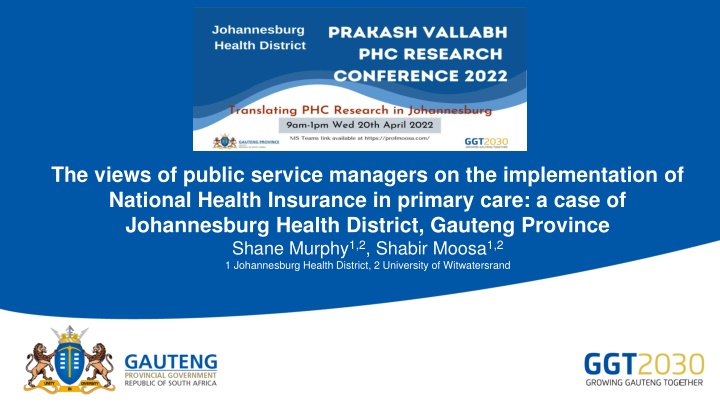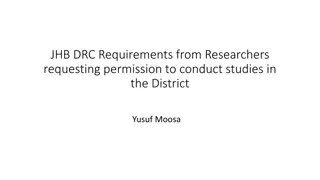
Public Service Managers' Perspectives on National Health Insurance in Primary Care
Explore the views of public service managers in Johannesburg Health District on the implementation of National Health Insurance (NHI) in primary care, focusing on their engagement, perceptions, and challenges. The qualitative study delves into their roles and insights to enhance NHI implementation.
Uploaded on | 2 Views
Download Presentation

Please find below an Image/Link to download the presentation.
The content on the website is provided AS IS for your information and personal use only. It may not be sold, licensed, or shared on other websites without obtaining consent from the author. If you encounter any issues during the download, it is possible that the publisher has removed the file from their server.
You are allowed to download the files provided on this website for personal or commercial use, subject to the condition that they are used lawfully. All files are the property of their respective owners.
The content on the website is provided AS IS for your information and personal use only. It may not be sold, licensed, or shared on other websites without obtaining consent from the author.
E N D
Presentation Transcript
The views of public service managers on the implementation of National Health Insurance in primary care: a case of Johannesburg Health District, Gauteng Province Shane Murphy1,2, Shabir Moosa1,2 1 Johannesburg Health District, 2 University of Witwatersrand
Background Background SA National Health Insurance (NHI) Universal Health Coverage (UHC) Single pool drawn mostly from current public spend Strategic purchasing Separation of funder (NHI), purchaser and provider Decentralisation of funds Mixed capitation contracting [vs line item/FFS]
Background Background Contracting Units for Primary healthcare Services (CUPS) Sub-district level Purchasers of service from public/private providers District Health Management Offices (DHMOs) Support and monitor CUPS. Decentralised operational unit of PHC Decision-making capacity with direct control of funds
Background Background Views of district-level managers? Responsible for these units Knowledge of NHI Bill? Appreciation of challenges? Possible solutions? STUDY AIM: To explore district and sub- district managerial views on NHI and their role in its implementation.
Methods Qualitative study with in-depth interviews Purpose sampling of managers in Jhb Health District Interview Guide What are your views on National Health Insurance Can you tell me about your engagement in NHI policy development? What is your perception of the implementation of NHI? Is there any other view or thought you would like to express? Interviews taped, transcribed and member-checked
Methods Analysis Framework Analysis: familiarization, framework formulation, coding and indexing, charting, and mapping and interpretation. Permissions University of Witwatersrand s Human Research Ethics Committee (M191046), Research Committee of the Johannesburg Health District (GP_202006_048).
Results Three main themes Lack of managerial engagement in NHI policy (2) Managerial views on NHI (3) Perceptions of current NHI implementation (6)
Results Lack of managerial engagement in policy Poor communications and engagement with NHI rollout Basically, we hear NHI from the media; we haven t really had people come in and talk to the people. R5 Non-consultative organisational culture But what can I say, because the government has decided they will implement what they have decided to do. R7
Results Managerial views on NHI General managerial ignorance on NHI policies/documents I don t know, I really don t have an idea R4 NHI will address social disparities (private to public) The issue of overcrowding on public institutions, I think it will also reduce that which will actually reduce on the number of litigations. R1 Not applicable to South Africa (Minor view)
Results Perceptions of NHI implementation Concerns around corruption It s all about corruption, people who are enriching themselves R5 I definitely don t think that the current structure should govern it. R3 Concerns around current healthcare infrastructure / policies The second thing is, remember, our health information system, our epidemiological data, is limited; how do they begin to develop appropriate plans. R6 Fragmentation and incoordination of services We do have lots of unforeseen problems, to ensure that there s still uninterrupted electrical supply at the clinics. R4
Results Perceptions of NHI implementation Human resource challenges and she said to me, it s because of workload; I m frustrated before nine o clock, because I have to stand and attend to more than fifty people then I ask in private, in private I ll be allocated only five .R1 Poor readiness to implement NHI We are still far, because even the tools for the hospitals it s still on the trial, on the draft. R5 Potential avenues to facilitate NHI implementation Digitalisation, build capacity of managers, communicate with all stakeholders and appraise efforts
Discussion Managerial engagement is poor Poor engagement at lower levels undermines decentralized models Managerial views on NHI Address social inequities BUT seen as panacea for public service with simple redistribution from private Perceptions of NHI implementation Concerns re corruption, poor infrastructure, fragmentation and capacity subdistrict management?
Thank you Masters Study by Dr. Shane Murphy, Final Year Registrar Family Medicine 2021 Presented by Prof. Shabir Moosa Johannesburg Health District/Wits Family Medicine shabir@profmoosa.com

